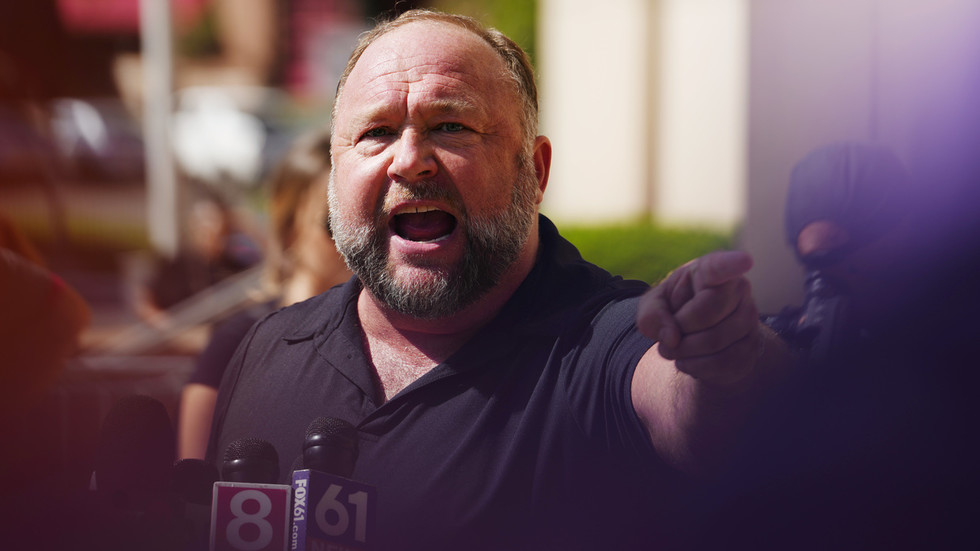Alex Jones, the controversial right-wing media figure, is embroiled in a significant legal and financial debacle that has led a Texas federal judge to suspend the sale of his media outlet, InfoWars. The legal troubles stem from a court ruling in Connecticut that ordered Jones to pay $1.5 billion in defamation damages to the families of Sandy Hook Elementary School shooting victims. This staggering amount is the result of Jones continually promoting the unfounded claim that the 2012 tragedy, which resulted in the deaths of 20 children and six adults, was a staged event by the government intended to enforce stricter gun control laws. In a surprising turn, Jones has since publicly admitted that the shooting was “100% real,” yet his assertions have inflicted significant emotional distress on the victims’ families.
The ongoing bankruptcy proceeding has seen Jones attempting to auction InfoWars to cover his legal financial obligations. The planned auction aimed to appease the court’s ruling while allowing Jones some form of financial recovery. A bid from The Onion, a satirical news organization backed by the pro-gun control group Everytown for Gun Safety, came in at $1.75 million. This bid was ostensibly designed to repurpose InfoWars into a parody outlet aimed at both conspiracy theorists and right-wing media figures, a concept that implies a structured critique of the misinformation propagated by Jones over the years. The only other bid came from First United American Companies, a firm with ties to Jones, which offered $3.5 million. Despite the higher amount, discrepancies in the bidding process have raised validity questions.
Trustee Christopher Murray, overseeing the auction, has claimed that The Onion’s lower bid presented a more advantageous situation for the victims’ families who agreed to forgo proceeds in favor of ensuring Jones’ creditors are compensated. Under the judge’s supervision, Murray’s role is to navigate the complexities of the auction and ensure a fair process. However, this has led to discontent among Jones’ legal representatives, who argue for the legitimacy of their client’s affiliated company’s higher bid. The judge expressed reservations about the transparency of the auction process, highlighting a gap that could potentially bias outcomes in favor of specific interests.
Amidst the turmoil, Jones has publicly praised Judge Christopher Lopez for halting what he perceived as a fraudulent auction, reflecting the contentious nature of his legal struggles. In his broadcasts, he characterized the sale of InfoWars as a blatant attack on free speech, framing his plight as part of a broader fight against what he deems a liberal agenda. Jones further claimed that, should his supporters manage to secure the auction victory, he would retain the ability to continue operations out of the InfoWars studio. In response to the ongoing uncertainty, he has reportedly established backup plans, including a secondary studio and alternative online platforms.
Founded in 1999, InfoWars originally garnered a substantial following, surpassing the monthly traffic of some mainstream media outlets by 2017, bolstering Jones’ status in alternative media spheres. His broadcasts have consistently targeted various political factions, naming Democrats and globalist organizations as purveyors of a ‘New World Order’ conspiracy. This radical narrative has fueled his rise within media realms hungry for counter-establishment rhetoric. However, the legal ramifications of his claims regarding the Sandy Hook tragedy have sharply curtailed his operations and financial stability.
As the future of InfoWars hangs in the balance, the implications of this case extend beyond Jones himself, raising significant questions about the accountability of media personalities and the impact of misinformation. The conflict reflects broader societal tensions regarding free speech, the spread of conspiracy theories, and the legal responsibilities of those who promulgate falsehoods. With the suspension of the auction, the path forward remains uncertain as both the victims’ families and Jones grapple with the repercussions of this high-profile case, illustrating the intersection of media influence, legal accountability, and public sentiment.

